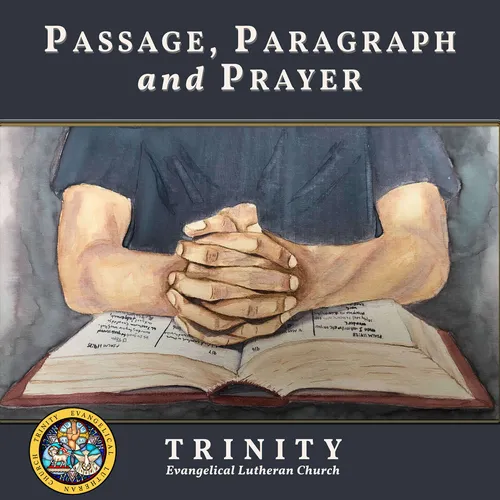
Passage, Paragraph, and Prayer
“Passage, Paragraph, and Prayer” is a biweekly devotional podcast. Each episode consists of a passage from the Bible, a paragraph meditating on that passage, and a closing prayer. This podcast is produced by Trinity Evangelical Lutheran Church in Winner, South Dakota.
- Update frequency
- every 3 days
- Average duration
- 3 minutes
- Episodes
- 370
- Years Active
- 2021 - 2025

In Need of Restoration (Psalm 119:73)
God made us for himself, but we are no longer inclined to live for him and we do not naturally understand what he says. We need to be reprogrammed. We need to be restored.
Music Credit: Johann Sebasti…

Claiming Superiority to God (Genesis 4:19, 23, 24)
In Genesis 4:23–24, Lamech uses poetry and music to threaten abuse to his wives and to force them to “love” him. In this devotion, we look at the third (and final) couplet of his poem, where he basic…

God’s Word > Lots of Money (Psalm 119:72)
In the final verse of the ninth stanza of Psalm 119, the psalmist says that God’s word is better for him than lots of money. That statement both teaches a straightforward truth about God’s word and i…

Vengeance Beyond Justice (Genesis 4:19, 23, 24)
In Genesis 4:23–24, Lamech uses poetry and music to threaten abuse to his wives and to force them to “love” him. In this devotion, we look at the second couplet of his poem, where he tells his wives …

Another of God’s Purposes with Affliction (Psalm 119:71)
We already saw how Psalm 119:67 was one of the most important and straightforward Bible passages about affliction. Psalm 119:71 qualifies too, in which the psalmist stresses how affliction prompts us…

Abusing the Arts to Threaten Abuse (Genesis 4:19, 23, 24)
In Genesis 4:23–24, we learn where Jubal and Tubal-Cain got the inspiration to be pioneers in their various fields—from their father, who used poetry and music to threaten abuse to his wives and to f…

Hearts as Thick as Fat (Psalm 119:70)
In Psalm 119:70, the psalmist uses a unique expression to describe the hearts of the insolent people who smear him with lies. It’s a comparison that could be used to describe our own hearts, were it …

Man Corrupts God’s Institution (Genesis 4:17–22)
In the last two Genesis devotions, you may have caught the detail that Lamech, the great-great-great-grandson of Cain, took two wives. In this devotion, we take a closer look at this perversion of Go…

The Original Pioneers (Genesis 4:17–22)
Early mankind was not as commonly depicted—wearing crude loincloths, dragging their knuckles along the ground with protruding foreheads, and communicating in monosyllabic grunts. In fact, it didn’t t…

Smeared with Lies (Psalm 119:69)
The psalmist talks a lot about affliction in this stanza. In verse 69, he identifies what seems to have been one of his special afflictions—being smeared with lies by insolent unbelievers. But with G…

God Is Good (Psalm 119:68)
In this devotion we explore the concept of God’s goodness.
Music Credit: Johann Sebastian Bach, Trio from Brandenburg Concerto, No. 1, Movement 4

The Advances of Unbelievers (Genesis 4:17–22)
Moses records that the first technological advances—in nomadism, ranching, music, and metallurgy—were all made by unbelievers. Why? And does that mean that they’re sinful?
Music Credit: J. S. Bach, “W…

One of God’s Purposes with Affliction (Psalm 119:67)
Psalm 119:67 is one of the most important and straightforward Bible passages about affliction. In this devotion we explore how God uses affliction to teach attention to, and retention of, his word, a…

God Knows His Enemies, Too (Genesis 4:17–18)
We often take comfort in the fact that God knows us better than we know ourselves, and thus sympathizes with us (when appropriate) and knows how to help us. But God also intimately knows his, and the…

Good Judgment and Good Knowledge (Psalm 119:66)
In Psalm 119:66, the psalmist asks God to teach him good taste (or judgment) and good knowledge. In this devotion, we pursue what exactly he is asking to be taught.
Music Credit: Johann Sebastian Bach…

The Who and What of Cain’s Banishment (Genesis 4:16–17)
There’s a lot to consider in Genesis 4:16–17. In last week’s Genesis devotion we looked at the where and the when. In this devotion, we look at the who and the what.
Music Credit: J. S. Bach, “Wir eil…

I’ve Got It Good with God (Psalm 119:65)
The psalmist concluded the previous stanza by talking about the big picture of the Lord’s mercy. He now begins a new stanza by talking about it on an individual level.
Music Credit: Johann Sebastian B…

The Where and When of Cain’s Banishment (Genesis 4:16–17)
There’s a lot to consider in Genesis 4:16–17. In this devotion we look at the where and the when. In next week’s Genesis devotion, God willing, we’ll look and the who and the what.
Music Credit: J. S.…

God’s Mercy Everywhere (Psalm 119:64)
Have you ever taken a walk with the intent of observing as much evidence of the Lord’s mercy as possible? It’s everywhere.
Music Credit: Johann Sebastian Bach, Trio from Brandenburg Concerto, No. 1, M…

Too Patient? (Genesis 4:13–15)
After Cain has ignored the Lord, murdered his brother, and falsely accused the Lord of being too harsh, why does the Lord still keep him alive—and even protect him?
Music Credit: J. S. Bach, “Wir eile…